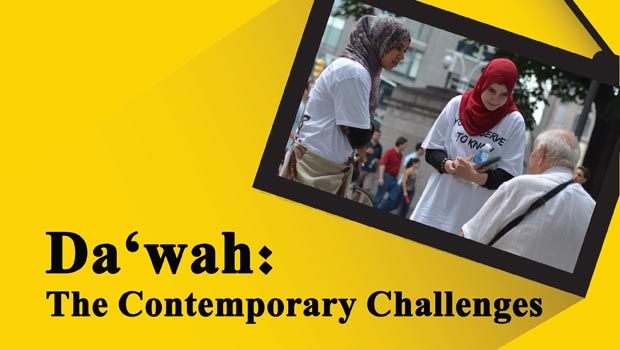Sh. Yusuf Al-Qaradawi relates the following account in his article Dialogue with the People of the Book and Exchange of Good Will on Holy Days:
“Once, in one of the festivals, Abdullah bin Omar said to his servant: “Don’t forget our Jewish neighbor when you slaughter a sheep, or a similar action.” Each time he entered or left the house he would repeat the saying, “Don’t forget our Jewish neighbor.” The servant replied: “Truly you have been excessive in your exhortations concerning this Jew.” To which he replied: “Indeed, I heard the Prophet—may God bless him and grant him peace—say: ‘The Angel Gabriel kept exhorting me with regard to (the rights of) neighbors until I thought that he would give them the right to inherit.’”
This exchange about a Jewish neighbor between Abdullah bin Omar and his servant point to the respect and care that a Muslim should have regarding his neighbor and those of other faith traditions. To respect and care about others, about their rights and their well-being, is central to the Islamic ethic. A pivotal point as well is the importance of inviting others to Islam. How would one do so unless he or she interacts with those who are not Muslim, engaging in dialogue, finding ways to cooperate for the common good, and discovering those similarities that unite all people who wish to live on earth in peace? For these reasons and many others, interfaith dialogue is a valuable and productive endeavor for Muslims.
Interfaith Dialogue is Not the Place to Make Dawah – So Why Participate?
There are those who say that interfaith dialogue is not the place to make dawah so they discourage Muslim participation. But we should consider the reality expressed in the well-known Christian adage, “Preach the Gospel at all times and when necessary use words.” This points to the reality that one’s generosity, truthfulness, kindness and a myriad of other benevolent and pious traits are ways to invite others to one’s faith. Words fall flat if the full-bodied expression of faith is not evident in one’s demeanor, attitudes, conduct, etiquette, and ethics. So, in a primary sense, participating in interfaith dialogue is a way to invite others, in a living, personally illustrative manner.
Interfaith dialogue is a way of getting to know one’s “neighbors.” It is a way of mutual welcoming, with hospitality, to get to know one another’s beliefs and convictions, to build trust across faith traditions, and to create a shared vision of understanding, tolerance, and dignity for all people.
Interfaith dialogue acknowledges that the various faith communities represent diverse perspectives, and strives to make space for the voices of the global community of races, cultures, and religions to testify to their belief in God and the universal religious imperative to do good.
Interfaith dialogue recognizes that we are living in an interdependent world and that the scourges of poverty, injustice, oppression, and conflict can only be addressed by well-intentioned people the world over, cooperating and collaborating in efforts to provide for the needy, stand up for social justice, and commit to peacemaking.
Guidelines for Muslims Who Participate in Interfaith Dialogue
Interfaith dialogue rests upon principles of mutual respect, trust, and goodwill. The following guidelines can be useful for a Muslim participating in interfaith dialogue:
Establish a primary goal of seeking to know the other participants and to learn from them, just as they can learn from you. This can only take place in an atmosphere of openness in which participants are willing to express themselves honestly and are willing to listen with the intention to understand rather than to judge.
Agree to a first principle that all participants are worthy of respect, dignity, and a place to speak in the dialogue with his/her peers. Therefore, the aim is to honor the right of each one to his belief, and accept that at the table of dialogue all beliefs are equally present and legitimate. While adhering to your own convictions about your faith tradition, recognize that all come to the dialogue with their own, similarly deep and heartfelt, belief and conviction. Dialogue is not the place to discredit another’s belief; and dialogue can only proceed when participants see one another as equal peers rather than inferiors.
Interfaith dialogue is not the venue for direct dawah. Promoting the correct understanding and rightful appreciation of the faith of each participant is an integral part of the dialogue and interaction, and this is expected and appropriate. But proselytizing in a blatant or obtrusive way, or criticizing or demeaning another faith, are to be categorically avoided.
Each participant is representing a faith. Keep in mind, however, that true dialogue and deeper understanding occurs on a personal basis. Therefore, it is best to speak on a human level even when presenting doctrine. The point is to avoid being “doctrinaire.” And certainly one should avoid coming across in a dogmatic or arrogant way. Speaking from the heart touches others. Bringing one’s faith alive results from being genuine and humble about one’s devotion and conviction.
When talking about one’s faith, avoid language that connotes superiority, exceptionalism, or being the best. For example, rather than saying “Islam is the fastest growing religion…” one could say, “We have seen a growing number of people inquiring about Islam.”
Be careful about using vocabulary from your tradition that others may not understand. Instead of saying wudu, say ritual washing or ablution; instead of salat say daily prayer, etc.
Present Islamic beliefs and teachings accurately. Do not dilute or skew some point in order to accommodate or win over others. They will respect your honesty and appreciate your fidelity and authenticity of faith.
Remember that statements made by other participants that come across as offensive to Islam or Muslims are most likely due to misunderstanding or stereotypes. Respond to those who make such statements, not with defensiveness, hostility, or annoyance, but as if they have gifted you with a wonderful opportunity to gently and respectfully address those confusions and errors.
Keep in mind that while learning about others’ religious beliefs and traditions, you can experience a fuller deepening appreciation and more mature conviction about your own beliefs. Knowing this, you can look upon the other participants as fellow aspirants to spiritual wisdom and self-transformation rather than as opponents or adversaries.
Interfaith dialogue is a grand opportunity to practice faithful listening. This kind of listening is of the heart as much as of the ear. This kind of listening seeks greater understanding of oneself and others. It hears words with compassion and desire to understand, rather than judgment. Faithful listening is keen to affirm others’ viewpoints and experiences as valid for them, without the necessity to agree with them or believe what they believe. Faithful listening seeks always to learn and grow and to hear in an open way that allows continual examination of your own attitudes, assumptions, and judgments of others. Faithful listening is patient and willing to allow others to express themselves to completion.
Focus on the prospects afforded by interfaith dialogue to join together in upholding the principle of freedom of conscience, that each may worship according to their choice; and the responsibility of conscience to advocate and defend the requisites of social justice. In this way, individuals of various faiths can work together toward a goal of creating social and political systems that honor the rights, needs, and dignity of all people.
“To each is a goal to which Allah turns him; then strive together [as in a race] towards all that is good. Wheresoever you are, Allah will bring you together. For Allah has power over all things” (Qur’an 2:148).






